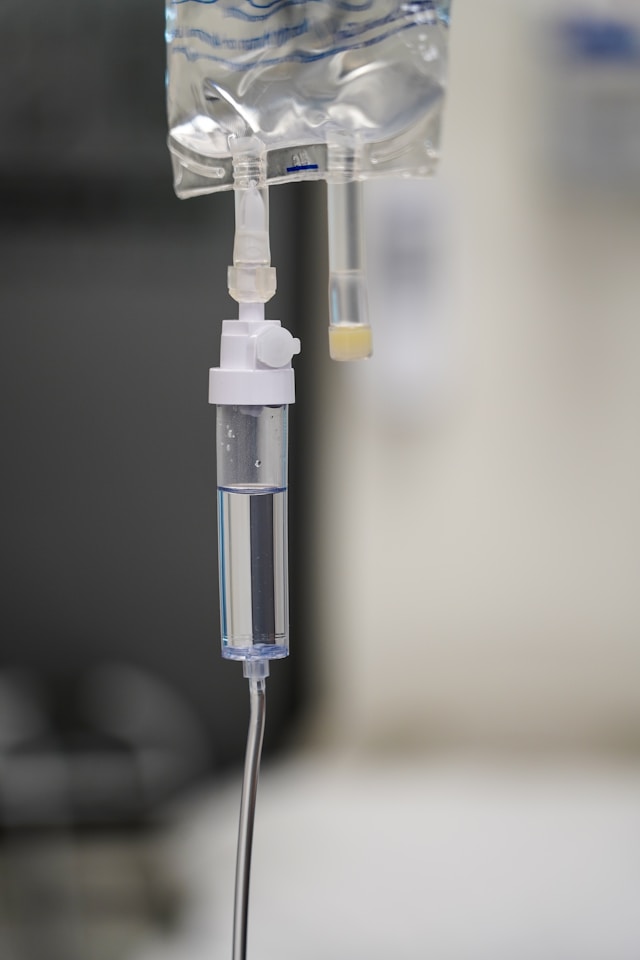
How to Prepare for an Infusion Appointment


Dr. Chen is a board-certified immunologist with over 15 years of experience treating autoimmune and immunodeficiency disorders. She specializes in IVIG therapy and has published extensively on immune system treatments.
Medical Disclaimer
Proper preparation for your infusion appointment can make a significant difference in your comfort, the ease of the procedure, and how you feel afterward. Whether this is your first infusion or you've been receiving treatment for months, knowing how to prepare yourself physically and logistically helps ensure the best possible experience. Most preparation steps are simple, but they can have a meaningful impact on how smoothly your appointment goes and how well you tolerate your treatment.
Key Highlights
- Staying well-hydrated in the 24 hours before your infusion makes IV placement easier and can reduce side effects like headaches.
- Bringing entertainment, comfortable clothing, and snacks can make longer infusion appointments more pleasant and help time pass quickly.
- Understanding what paperwork, insurance information, and medical history details to bring prevents delays and ensures smooth check-in.
In the Days Before Your Infusion
Preparation for a successful infusion actually begins several days before your appointment:
Confirm Your Appointment: Call your infusion center 2-3 days before your scheduled time to confirm the date, time, and location. Verify that they've received your prescription and that your medication will be ready. Some medications require special ordering or preparation, so early confirmation prevents last-minute issues.
Verify Insurance Authorization: If this is your first infusion or you've recently changed insurance, confirm that prior authorization is complete and approved. Ask if there are any out-of-pocket costs you should be prepared to pay at your visit.
Review Pre-Medication Instructions: Some doctors prescribe medications to take at home before your infusion—antihistamines, acetaminophen, or other pre-medications. Confirm what you should take, at what time, and whether you should bring anything with you.
Arrange Transportation: If this is your first infusion with a new medication, arrange for someone to drive you home. While many patients drive themselves without problems, it's wise to have backup transportation available until you know how you'll respond. Some medications cause drowsiness or fatigue that makes driving unsafe.
Plan Your Schedule: Block out adequate time—infusions take longer than most medical appointments. Plan for at least 3-4 hours for your first infusion, though subsequent visits may be shorter. Avoid scheduling important obligations immediately afterward.
Request Time Off if Needed: If your infusion is during work hours, request time off or arrange to work remotely if you'll be able to use a laptop during treatment. Some employers allow infusion appointments to be covered as medical leave.
According to the Mayo Clinic, patients who prepare thoroughly tend to have more positive infusion experiences and feel more in control of their treatment.
The Day Before Your Infusion
Start Hydrating: Begin drinking extra water or other fluids. Good hydration makes your veins more visible and easier to access for IV placement. Aim for at least 8-10 glasses of water throughout the day before your infusion.
Get Adequate Rest: Try to sleep well the night before your infusion. Being well-rested helps your body tolerate treatment better and may reduce fatigue afterward. Stress and anxiety can interfere with sleep, so practice relaxation techniques if you're feeling nervous.
Avoid Alcohol: Don't drink alcohol for 24 hours before your infusion. Alcohol can cause dehydration, make veins harder to access, and potentially interact with your medications.
Review What to Bring: Gather everything you'll need (detailed list below) so you're not scrambling the morning of your appointment.
Prepare Comfortable Clothing: Set out loose, comfortable clothes with sleeves that roll up easily past your elbow. Layered clothing is ideal since infusion centers can vary in temperature.
Pack Snacks and Meals: If your infusion will be long, prepare or purchase snacks and possibly a light meal to bring with you. Check if there are any dietary restrictions related to your specific medication.
The Morning of Your Infusion
Continue Hydrating: Drink 2-3 glasses of water when you wake up, even before coffee or tea. Continue sipping water until you leave for your appointment. Good hydration is one of the simplest but most effective preparation steps.
Eat a Balanced Meal: Unless your doctor has given specific fasting instructions, eat a normal, balanced meal 1-2 hours before your appointment. Having food in your stomach can help prevent nausea and provides energy during your treatment. Avoid very heavy, greasy, or spicy foods that might cause stomach upset.
Take Your Regular Medications: Unless specifically instructed otherwise, take your usual daily medications on schedule. If you're unsure whether to take something, call your healthcare provider's office before your appointment.
Take Prescribed Pre-Medications: If your doctor prescribed medications to take before your infusion (like antihistamines or acetaminophen), take them at the specified time—usually 30-60 minutes before your appointment.
Dress Appropriately: Wear your comfortable, loose-fitting clothing with easily accessible arms. Avoid tight sleeves, complicated tops that are difficult to adjust, or anything with excessive jewelry or accessories.
Use the Bathroom: Make sure to use the bathroom before leaving home, even if you don't feel a strong urge. While you can use the bathroom during your infusion, it's more convenient to start with an empty bladder.
What to Bring to Your Infusion
Having the right items with you makes your infusion appointment smoother and more comfortable:
Essential Documents:
- Photo identification (driver's license or ID card)
- Insurance card (both sides)
- Medication list including doses and frequency
- Allergy list
- Doctor's order or prescription if you have a copy
- Any forms your doctor or infusion center asked you to complete
- Payment method for any copays or fees
Medical Information:
- List of current symptoms or concerns to discuss
- Record of previous infusion reactions if applicable
- Recent lab results if relevant
- Contact information for your prescribing doctor
- Name and phone number of your pharmacy
Comfort Items:
- Water bottle (some centers provide water, but having your own ensures you can sip continuously)
- Snacks (granola bars, crackers, fruit, or other easy-to-eat items)
- Light sweater or blanket (even if the center provides blankets, having your own can feel comforting)
- Small pillow for neck or back support
- Lip balm (infusion centers can be dry)
- Hand lotion
Entertainment:
- Book, e-reader, or magazine
- Tablet or laptop (verify Wi-Fi availability)
- Headphones for watching videos or listening to music/podcasts
- Phone charger and portable battery if you have one
- Work materials if you plan to be productive
Optional Items:
- Stress ball or fidget item if that helps you relax
- Eye mask if you want to nap
- Notebook and pen for taking notes or journaling
- Crossword puzzles or games
- Tissues
The Infusion Nurses Society recommends bringing items that help you feel relaxed and comfortable, as stress can sometimes make IV placement more difficult and may increase side effects.
Preparing Your Body
Beyond paperwork and entertainment, preparing your body properly can significantly improve your infusion experience:
Optimize Hydration: This cannot be emphasized enough. Well-hydrated patients have more visible, accessible veins that are easier to cannulate. Hydration also helps your body process and eliminate the medication, potentially reducing side effects like headaches. Drink water consistently in the 24 hours before your infusion.
Warm Your Arms: If you have difficult veins or have had trouble with IV placement in the past, warm your arms before your appointment. Take a warm shower letting water run over your arms, or apply warm compresses. Warmth dilates veins making them easier to see and access.
Avoid Excessive Caffeine: While a normal amount of coffee or tea is fine, excessive caffeine can cause dehydration and vasoconstriction (narrowing of blood vessels). Stick to your regular caffeine routine rather than drinking extra "to wake up."
Eat Strategically: A light to moderate meal is ideal. Arriving on an empty stomach can make nausea more likely, but eating a very heavy meal might cause discomfort while sitting for an extended period.
Exercise Lightly (Day Before): Gentle exercise like walking the day before your infusion can improve circulation and make veins more prominent. However, avoid strenuous exercise the morning of your infusion as it can cause temporary dehydration.
Manage Anxiety: If you're feeling anxious, practice relaxation techniques—deep breathing, meditation, or visualization. Some patients find it helpful to listen to calming music on their drive to the appointment. High anxiety can cause vasoconstriction, making IV placement more difficult.
Special Preparations for Specific Situations
If You Have Difficult Veins:
- Hydrate extra diligently for 48 hours before your appointment
- Keep your arms warm—wear long sleeves to your appointment
- Let your nurse know about your vein history immediately
- Ask if warming packs are available to dilate veins before insertion
- Consider requesting your most experienced nurse for IV placement
If You Have Needle Anxiety:
- Arrive a few minutes early to give yourself time to relax before the procedure
- Practice deep breathing or bring calming music to listen to during IV insertion
- Ask about topical numbing cream if your anxiety is significant
- Let your nurse know—they can talk you through the process and work quickly
- Bring a trusted friend or family member for support if the facility allows visitors
- Consider looking away during IV insertion
For Your First Infusion:
- Arrive 15-20 minutes early for additional paperwork
- Bring a list of questions you want to ask
- Plan for extra time—first infusions typically take longer
- Definitely arrange backup transportation
- Bring extra snacks and entertainment in case monitoring time is extended
If You're Prone to Side Effects:
- Take all prescribed pre-medications exactly as directed
- Bring your own supply of acetaminophen or other remedies your doctor has approved
- Pack extra layers in case you experience chills
- Plan to rest the remainder of the day after your infusion
- Have easy-to-prepare meals ready at home
Logistical Preparation
Know Where You're Going: If this is your first time at this infusion center, look up directions, parking information, and building/suite numbers in advance. Some hospital-based centers can be confusing to navigate.
Plan for Parking: Many hospitals charge for parking. Bring cash or verify payment methods accepted. Know where patient parking is located and how long your validation covers.
Arrive on Time: Plan to arrive 10-15 minutes early (more for first visits). This gives you time to check in, use the bathroom, and settle in without feeling rushed. However, arriving too early (more than 30 minutes) may mean waiting before your medication is ready.
Communicate Schedule Constraints: If you have a hard stop time (need to pick up children, must catch transportation, etc.), tell the staff at check-in. While they can't always guarantee exact timing, they'll do their best to accommodate urgent scheduling needs.
Prepare Your Home: Before you leave, set up your home for when you return. Have water, snacks, and entertainment easily accessible. Put comfortable clothes out. Make your space comfortable in case you feel fatigued after treatment.
What to Expect at Check-In
When you arrive at your infusion appointment, the check-in process typically includes:
Registration: Providing your identification and insurance information, signing consent forms, and updating any changed contact or medical information.
Financial Verification: Confirming your copay amount and payment if applicable. Some centers collect payment before treatment, others bill afterward.
Medical Screening: Brief questions about current symptoms, medications, allergies, and any changes since your last visit. Your temperature and sometimes other vital signs may be checked during check-in.
Medication Confirmation: Verifying which medication you're receiving and that your prescription is current and correct.
Being organized with your paperwork and information speeds this process significantly.
Frequently Asked Questions
Should I eat before an infusion?
Yes, unless your doctor has given specific fasting instructions, you should eat a normal, balanced meal 1-2 hours before your infusion. Having food in your stomach helps prevent nausea and provides energy during treatment. Avoid arriving on an empty stomach or overly full. Light to moderate meals work best—consider options like oatmeal with fruit, a sandwich with vegetables, yogurt with granola, or similar balanced choices.
How much water should I drink before an infusion?
Aim to drink at least 8-10 glasses of water (64-80 ounces) in the 24 hours before your infusion, with 2-3 glasses on the morning of your appointment. Good hydration makes IV placement easier and may reduce side effects. Continue sipping water during your infusion as well. However, if you have medical conditions that restrict fluid intake, follow your doctor's specific guidance.
Can I drive myself home after an infusion?
Many patients drive themselves home without any problems. However, for your first infusion with a new medication, arrange backup transportation in case you experience fatigue, dizziness, or other side effects that make driving unsafe. Some medications commonly cause drowsiness—your healthcare provider can tell you if this applies to your treatment. After you know how you respond, you can usually drive yourself to subsequent appointments.
What should I wear to an infusion appointment?
Wear comfortable, loose-fitting clothing with sleeves that easily roll up past your elbow to allow IV access. Layered clothing is ideal since infusion center temperatures vary—you might want a sweater even if it's warm outside. Avoid restrictive clothing, complicated outfits, or anything that would be uncomfortable while sitting for extended periods. Many patients choose soft pants or leggings and a loose, comfortable top.
How early should I arrive for my infusion?
Arrive 10-15 minutes before your scheduled time for routine infusions. For first appointments, arrive 15-20 minutes early to allow time for additional paperwork and orientation. Arriving too early (more than 30 minutes) may mean waiting since your medication might not be prepared yet. Call the infusion center if you're running late so they can adjust their schedule accordingly.
Being Prepared Reduces Stress
Thorough preparation for your infusion appointment helps everything go more smoothly and allows you to focus on relaxing during your treatment rather than worrying about logistics or discomfort. The investment of time in preparing properly pays off in a better infusion experience.
Most of these preparation steps become routine once you've had several infusions, and you'll develop your own personalized approach based on what works best for you.
Ready to find an infusion center that supports you through every step of treatment? Explore infusion centers near you to begin your treatment journey with confidence.
Medical Disclaimer: This content is for educational purposes only and is not a substitute for professional medical advice, diagnosis, or treatment. Always consult your healthcare provider with questions about your medical condition or treatment options.
Article Statistics


Table of Contents
Article Statistics










